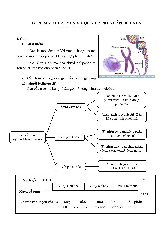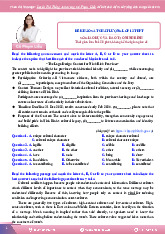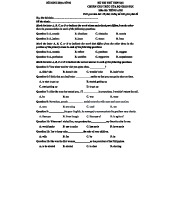





Preview text:
SỞ GD-ĐT BẮC NINH
ĐỀ KHẢO SÁT CHẤT LƯỢNG CỤM TRƯỜNG THPT NĂM HỌC 2025 - 2026 TT1- QV1- LVT MÔN: Tiếng Anh 12
Thời gian làm bài: 50 phút --------------------
(không kể thời gian phát đề)
(Đề thi có 06 trang)
Họ và tên: ............................................................................ Số báo danh: ....... Mã đề 1102
Read the following passage about endangered birds and mark the letter A, B, C or D on your answer
sheet to indicate the best answer to each of the following questions.
Hygiene has played a vital role in human civilization throughout history. Ancient civilizations, such
as the Egyptians, Greeks, and Romans, were among the first to recognize the importance of cleanliness for
health. They practiced bathing and used natural oils to maintain personal hygiene. The Romans even built
elaborate public bathhouses, which became social centers for relaxation and sanitation. These early efforts
showed an understanding that hygiene was linked to overall well-being.
During the Middle Ages, however, attitudes towards hygiene changed significantly. The spread of
diseases like the Black Death led people to believe that bathing could make them more vulnerable to
infections. As a result, frequent bathing became rare, and cleanliness was not prioritized. Many people
relied on strong perfumes to cover body odor, while poor waste management in cities created unsanitary
conditions. This lack of hygiene contributed to widespread illness and high mortality rates.
The 19th century marked a turning point in the understanding of hygiene with the rise of scientific
discoveries. Pioneers like Louis Pasteur and Joseph Lister demonstrated the link between germs and
diseases, leading to improved medical practices and public health measures. The introduction of
handwashing and sterilization in hospitals greatly reduced infection rates. Public awareness campaigns
and government regulations began to promote better hygiene in everyday life.
Today, hygiene remains a crucial aspect of public health and daily routines. Advancements in
technology have made access to clean water and sanitation facilities more widespread. People now
understand the importance of practices like handwashing, brushing teeth, and proper waste disposal. The
history of hygiene reflects humanity's ongoing efforts to protect health and prevent disease, proving its significance across time.
(Adapted from www.exceptionalfutures.com)
Question 1. Which of the following best paraphrases the underlined sentence in paragraph 3?
A. Promoting handwashing and sterilization in hospitals gradually decreased infection rates.
B. Discouraging the use of handwashing and sterilization in hospitals slightly increased infection rates.
C. Implementing handwashing and sterilization in hospitals significantly lowered infection rates.
D. Imposing a ban on handwashing and sterilization in hospitals dramatically increased infection rates.
Question 2. Which of the following is NOT mentioned as an ancient civilization that practiced hygiene? A. Romans B. Greeks C. Egyptians D. Indians
Question 3. The word elaborate in paragraph 1 is OPPOSITE in meaning to . A. sophisticated B. complex C. simple D. modern
Question 4. The word them in paragraph 2 refers to . A. diseases B. perfumes C. infections D. people
Question 5. In which paragraph does the writer emphasize how living conditions have improved in recent times? A. Paragraph 3 B. Paragraph 2 C. Paragraph 1 D. Paragraph 4
Question 6. Which of the following is TRUE according to the passage?
A. Louis Pasteur and Joseph Lister linked germs to diseases.
B. People in the Middle Ages believed bathing caused infections.
C. Hygiene in ancient times was mainly about using perfumes.
D. The 19th century brought no changes to hygiene practices.
Question 7. The word unsanitary in paragraph 2 could be best replaced by . Trang 1 A. unusual B. unhealthy C. unlikely D. unsuitable
Question 8. In which paragraph does the writer mention a causal relationship that resulted in a decline in personal care habits? A. Paragraph 1 B. Paragraph 2 C. Paragraph 4 D. Paragraph 3
Read the following passage and mark the letter A, B, C or D on your answer sheet to indicate the option
that best fits each of the numbered blanks. Stress
In prehistoric times, the physical changes in response to stress were an essential adaptation for
meeting natural threats. The stress response, even in the modern world, (9) during critical events
such as sports activities, important meetings, or situations of actual danger. If stress becomes persistent
and low-level, however, the brain, heart, lungs, vessels and muscles become chronically over- or under- activated. (10)
. Acute stress can also be harmful in certain situations.
Studies suggest that (11)
is associated with depression or anxiety. In one study, two- thirds
of subjects who experienced a stressful situation had nearly six times the risk of developing depression
within that month. Some evidence suggests that repeated release of stress hormones disrupts normal levels
of serotonin, the nerve chemical (12)
. Certainly, on a more obvious level, stress diminishes the
quality of life by reducing feelings of pleasure and accomplishment, and relationships are often threatened.
The tensions of unresolved stress frequently cause insomnia, generally keeping the stressed person
awake or causing awakening in the middle of the night or early morning. In fact, evidence suggests that
stress hormones can increase during sleep in anticipation of a specific waking time. (13) .
Relaxation therapy has been found to reduce stress levels and consequently improve the quality of sleep.
(Adapted from Cambridge Vocabulary for IELTS) Question 9.
A. can raise levels of performance
B. have to greatly improve performance levels
C. increasing levels of performance
D. which can enhance performance levels Question 10.
A. This is not necessarily harmful to people’s physical and psychological conditions
B. This may produce physical or psychological damage over time
C. This is not likely to result in long-term damage to people’s physical and psychological well-being
D. This will possibly improve people’s physical and psychological well-being over time Question 11.
A. the inability to deal with stress
B. it is impossible to deal with stress
C. people are unable to handle stress
D. to be able to handle stress Question 12.
A. that is critical for feelings of well-being
B. what makes people feel that they are healthy
C. when feelings of well-being become essential
D. who is important for feelings of well-being Question 13.
A. However, there is some hope for sufferers in this area
B. Nevertheless, it is impossible to relieve people’s sufferings
C. Thus, there is no effective cure for sufferers in this area
D. Therefore, therapies for people’s sufferings are unavailable
Read the following passage and mark the letter A, B, C, D on your answer sheet to indicate the best Trang 2
answer to each of the following questions.
Are You Living or Just Surviving?
Imagine waking up each day, only to find that the world feels exactly the same as it did the day
before. [I] The routine is unchanging, and the excitement of life seems to have slipped through your
fingers. [II] Research indicates that when individuals fall into a cycle of monotony, they experience higher
levels of stress, dissatisfaction, and burnout. [III] This pattern can drain energy, leaving people feeling
disconnected from their passions and purpose. [IV]
As time passes, the reasons for beginning a particular path can be easily forgotten. The spark of
enthusiasm that once fueled people’s ambitions might fade as obligations and responsibilities take over.
In fact, studies in the Journal of Positive Psychology reveal that when people reconnect with the reasons
they initially set their goals, they experience a significant increase in motivation and fulfillment. A lack
of reflection on one’s purpose can lead to a life that feels passive, as if decisions are made out of habit
rather than intention. Those who forget why they started something often lose sight of what truly matters
to them, resulting in an existence that drifts along without much meaning or direction.
To shift from mere survival to meaningful living, it’s essential to create and pursue goals with
intention. Living with purpose doesn’t have to involve grand achievements. Experts have found that
having a sense of purpose is linked to better health, including reduced risk of cardiovascular diseases and
improved mental well-being. Purpose doesn’t need to come from a monumental task - it can arise from
everyday actions like nurturing relationships, taking care of personal health, or contributing to the community.
At the end of the day, the choice between living and surviving comes down to presence and
intention. Instead of following the same unthinking routine, we have the power to make conscious
choices that reflect what matters most to us. By embracing even the smallest goals, individuals can
overcome the numbness of survival and experience life more fully. As Viktor Frankl wisely said,
“Life is never made unbearable by circumstances, but only by lack of meaning and purpose.” A life of
purpose is not just about surviving - it’s about truly living.
(Adapted from health.harvard.edu)
Question 14. The word they in paragraph 2 refers to . A. people B. reasons C. goals D. studies
Question 15. Which of the following can be inferred from the passage?
A. Research demonstrates the impact of living with purpose on lifespan.
B. Small, consistent steps toward goals are more effective than taking large ones.
C. It is impossible to regain motivation without taking small gradual steps.
D. People should consciously choose actions that reflect their personal values.
Question 16. The word monumental in paragraph 3 is OPPOSITE in meaning to . A. indispensable B. insignificant C. undesirable D. inconsiderate
Question 17. Which of the following is TRUE according to the passage?
A. Having a social status contributes to living a purposeful life.
B. Purpose doesn’t always have to come from big achievements.
C. People should not aim for monumental tasks to find purpose.
D. A sense of monotony may provide a strong sense of purpose.
Question 18. Where in paragraph 1 does the following sentence best fit?
This sense of repetitiveness is a common trap many people fall into, where they aren’t really
living, they’re simply surviving. A. [II] B. [IV] C. [I] D. [III]
Question 19. Which of the following best paraphrases the underlined sentence in paragraph 3?
A. Embracing bigger challenges doesn’t mean that people can live with purpose.
B. Focusing on short-term tasks helps people feel more connected to other people.
C. The key to living lies in achieving goals helping people overcome survival mode.
D. By setting achievable goals, people can escape the feeling of merely existing.
Question 20. Which of the following best summaries the passage?
A. To live with purpose, individuals must move beyond routine tasks and seek both small and Trang 3
significant achievements, which contribute to better health, motivation, and a sense of direction.
B. Living with purpose does not necessarily require monumental achievements and avoiding any form of
routine to maintain motivation and improve mental health.
C. A life of purpose can be achieved through intentional actions, whether small or large, fostering
personal growth, better health, and a deeper sense of fulfillment, in contrast to mere survival.
D. Focusing on small, consistent goals instead of monumental ones can contribute to combating
monotony and bringing fulfillment, leading to better health and well-being.
Question 21. According to thepassage, which of the following is NOTmentioned as a way to create and pursue purpose?
A. accomplishing planned feats
B. building meaningful connections
C. giving back to the community
D. focusing on personal well-being
Question 22. The phrase take over in paragraph 2 could be best replaced by .
A. overwhelm their lives
B. alleviate their responsibilities
C. attract their attention
D. surpass their expectations
Question 23. Which of the following best summarizes paragraph 2?
A. The lack of reflection on one’s purpose can contribute to the loss of motivation, making life feel routine and directionless.
B. A passive life can stem from forgetting one’s initial reasons for setting goals, causing decisions to be made without intention.
C. As people continue along their paths, their motivations may not evolve over time, leading to a passive existence.
D. People often tend to forget the reasons they set their goals, which results in a lack of motivation and fulfillment.
Read the following advertisement and mark the letter A, B, C or D on your answer sheet to indicate the
correct option that best fits each of the numbered blanks. Too Young to Be Tired?
More and more young adults are feeling burned out before they even turn 25. Sound familiar?
You’re not alone. The pressure to succeed early and live a “perfect life” has created a silent (24) ,
which is often overlooked. Many Gen Z individuals say they feel tired, lost, and unsure of their path -
even while working hard. They struggle to rest, feel dissatisfied (25)
what they’ve achieved, and are often (26)
when comparing themselves to others.
This healing workshop is made just for you. We aim (27)
the root of early burnout, why
society continues to (28)
pressure on young people, and how you can create a healthier, slower
life. With expert-led talks, creative activities, and moments of deep rest, you’ll reconnect with your energy
and joy. You deserve a life (29)
with meaning, not just deadlines. Let’s talk about what truly matters.
Let’s slow down, together!
(Adapted from mindfulgeneration.org) Question 24.
A. health crisis mental
B. health mental crisis
C. mental health crisis
D. mental crisis health Question 25. A. for B. about C. with D. in
Question 26. A. disappointed B. disappoint C. disappoints D. disappointing
Question 27. A. exploring B. to exploring C. explore D. to explore Question 28. A. set B. put C. give D. make
Question 29. A. filling B. to fill C. which fill D. filled
Read the following leaflet and mark the letter A, B, C or D on your answer sheet to indicate the option
that best fits each of the numbered blanks. Trang 4
The World of Mass Media
The world of mass media has greatly transformed in the digital age. (30) recent studies, the
internet is now the most influential source of information for millions of people worldwide. The impact of
mass media on public (31)
cannot be underestimated, as it shapes people's views on important issues. For example, the (32)
of social media users has dramatically increased over the past decade, with
platforms like Facebook and Instagram leading the way. (33)
key development is the rise of video (34)
, which has become more popular than traditional text-based news.
Mass media also plays a role in raising awareness on various social issues, as it can (35) topics
that might otherwise remain unnoticed. The influence of mass media continues to grow, shaping both
culture and society every day.
(Adapted from Forbes) Question 30. A. Regardless of B. According to C. On account of D. In addition to Question 31.
A. comment B. tendency C. idea D. opinion Question 32. A. portion
B. item C. amount D. number Question 33. A. Others
B. Each other C. Another D. The others Question 34.
A. clip B. series C. content D. film Question 35.
A. run away B. put up C. bring up D. keep up
Mark the letter A, B, C or D on your answer sheet to indicate the best arrangement of utterances or
sentences to make a meaningful exchange or text in each of the following questions. Question 36.
a. The burning of wood for heating purposes is likely to produce little in the way of carbon emissions and is
therefore considered to be friendly to the environment.
b. Wood and coal are both useful sources of energy, and both are constantly in use around the world.
c. Coal, on the other hand, is termed the "enemy of the environment" as it is the largest source of carbon
emissions and is the greatest contributor to global warming.
d. This is because wood burning produces only as much carbon as if the tree were left alone to eventually rot in the ground.
e. However, while they each have their merits as fuel, the problems and hazards associated with their use are very different. A. e-a-b-d-c B. a-d-b-e-c C. b-e-a-d-c D. d-b-e-a-c Question 37. Dear Mr. Thompson,
a. I sincerely apologize for the inconvenience you faced and appreciate your patience as we work through the issue.
b. I would like to offer a solution that includes a discount on your next service as a gesture of goodwill.
c. Your feedback is invaluable to us, and we are currently reviewing your case to ensure that we can
improve and prevent similar situations in the future.
d. If you have any further questions or concerns, please feel free to reach out - I’m here to help!
e. Thank you for reaching out and sharing your concerns regarding your recent experience with our service. Best regards, Emily A. e - b - a - c - d B. e - b - c - a - d C. e - a - c - b - d D. e - c - d - a - b Question 38.
a. Tuan: That’s amazing. Can I join too?
b. Linh: My friend volunteers at a shelter for the homeless.
c. Linh: Yes, we go every Sunday to help serve food. A. c - b - a B. a - c - b C. b - c - a D. b - a - c Question 39.
a. Alex: Why AI-powered tools?
b. Alex: How are you going to improve your work productivity?
c. Alex: I think AI tools are too complex. I don’t think I’ll try them. Trang 5
d. Sue: I'm going to use AI-powered tools.
e. Sue: They help automate tasks, provide real-time data analysis, and can assist in making smarter decisions. A. b-d-a-e-c B. d-b-a-e-c C. c-e-d-b-a D. c-b-a-e-d Question 40.
a. However, despite the economic boom, environmental concerns about beach erosion and
overdevelopment remain prominent.
b. Once quiet, undeveloped beach areas along the coast have been replaced by luxury resorts and condos,
marking a shift towards tourism and real estate development.
c. This boom in development has attracted international investors, leading to new hotels, restaurants and tourist attractions.
d. The coastal city has undergone dramatic changes over the past few years.
e. The population has exploded as more people move to the area to work in the tourism and construction industries.
A. d – c – a – b – e
B. d – a – e – b – c
C. e – d – b – c – a
D. d – b – c – e – a
------ THE END ------ ĐÁP ÁN 1 2 3 4 5 6 7 8 9 10 C D C D D A B B A B 11 12 13 14 15 16 17 18 19 20 A A A A D B B A D C 21 22 23 24 25 26 27 28 29 30 A A B C C A D B D B 31 32 33 34 35 36 37 38 39 40 D D C C C C C D A D Trang 6
Document Outline
- Stress
- Question 9.
- Question 10.
- Question 11.
- Question 12.
- Question 13.
- This sense of repetitiveness is a common trap many people fall into, where they aren’t really living, they’re simply surviving.
- Question 24.
- The World of Mass Media
- Question 36.
- Question 37.
- Question 38.
- Question 39.
- Question 40.




